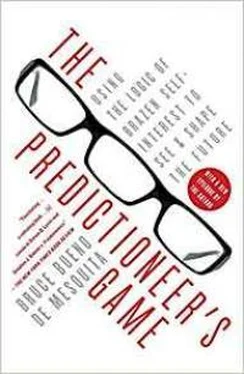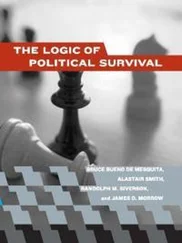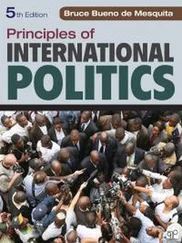Even if this complicated procedure could get committee approval, we would not have been home free. The procedure itself might be thwarted if a Mutt supporter caught on. For instance, if even one member of the second bloc worked out the results ahead of time, that member—who really wanted Mutt—could strategically (that is, by lying) decide to rank Jeff second and Moe last. Sure, that would have been a misrepresentation, but then the voter’s interest was in the final choice, not any intermediate decision. Acting strategically by inflating Jeff’s ranking, the bloc member would have ensured that Moe’s total in the rankings would come to 30 instead of 33, and so would Jeff’s, greatly complicating the process by creating a tie for second place and increasing the odds that Mutt would win. After all, in a runoff against Jeff (likely since more blocs preferred Jeff to Moe than the other way around), Mutt would be the winner. By acting strategically, then, it was possible for one or more members of the second bloc to ensure the election of their most preferred candidate, the detested Mutt. That was a chance I wasn’t willing to take. Instead I decided to get Curly elected.
Poor Curly—he was at a huge disadvantage. No one viewed him as their first-place choice. Nobody even thought of him as second choice. In fact, he was barely on anyone’s radar screen. I know that for sure because after working out how to get him elected, I had a conversation with a member of the selection committee. My role in the process was a secret, known only by the then CEO and me. I asked the committee member who he thought would be chosen, and he mentioned Mutt and maybe Moe. I nonchalantly asked about Jeff, Larry … and Curly. He took Jeff and Larry seriously, although he didn’t think they could win. Then he told me that neither he nor anyone else on the committee understood why Curly had put himself forward. After all, he said, he just doesn’t have a prayer, no one favors him. Sure, they liked him well enough, but they just didn’t seem to think of him as CEO material. Curly’s relative obscurity was, in this case, his great advantage. It was unlikely that anyone paid enough attention to Curly’s candidacy to maneuver strategically to thwart his prospects, since they didn’t think he had any.
Okay, so now the fun begins. The outgoing CEO was well liked and highly respected. He had done a good job. The beauty contests revealed enough to show how to get Curly elected (do you see how?), but I needed to analyze one more issue first. The question was whether the retiring CEO had enough clout to persuade the selection committee to follow the winning voting procedure. The analysis of that question showed that indeed he could get the committee to follow the voting rule he suggested, provided it wasn’t too complicated. Fortunately, the procedure my analysis suggested was an eminently reasonable rule. It wasn’t particularly complicated, and it capitalized on the committee’s majority not being keen to elect Mutt in the first place (remember, he had 6 first-place votes; 9 first-place votes were distributed among the others).
Agenda control—determining the order of decision making—can be everything. In this case it was. By setting the right agendas we could create a series of winning coalitions, each made up of different members from the one before, ending with a winning coalition supporting Curly and leaving no other candidate up for consideration.
The committee members understood that the real contest was between Mutt and Moe—or so they thought. To reinforce their view, the outgoing CEO persuaded the committee to use an agenda—a sequence of choices—that was made up of a specific sequence of head-to-head elimination contests. Of course there were too many candidates to ask the committee to compare each candidate to each other candidate, two at a time. That would have meant ten votes. Instead, the retiring CEO persuaded the committee to vote on Mutt versus Moe, with the loser of that contest being eliminated from consideration and the winner then going up against Jeff. Whoever lost that contest would be dropped from consideration, and the winner (who at this point in principle could have been Mutt or Moe or Jeff) would then be voted on against Larry, and the winner of that vote would finally be voted on against Curly. Whoever was left standing after those four votes would be deemed the winner.
This seemed like a good idea to the selection committee. They thought that by leading with strength—Mutt vs. Moe—they would quickly arrive at the one of those two who overall was most desired as CEO. How wrong they were. To be sure, anyone paying close attention to the five voting blocs’ preferences could have worked out how the retiring CEO’s agenda would work out, but it was unlikely that the committee members knew the full preference ordering of their compatriots. They, after all, were unlikely to conduct the sort of expert interviews called for by the model. Since they weren’t asked to announce their candidate rankings, the rule proposed by the retiring CEO did not compel them to reveal to each other their full ranking of candidates. Probably on their own they had not probed one another beyond second-place preferences. That, presumably, was why they paid so little attention to Curly. So here is what happened:
Moe beat Mutt right off the bat—by a vote of 9 to 6 (blocs 1 and 2 voting for Mutt and the rest voting for Moe, as you can see from the rankings listed earlier). Mutt, being the loser, was dropped from consideration under the seemingly reasonable supposition that more people wanted Moe than Mutt (9, as we saw, to 6). Fair enough. Everything after that was gravy, because my client’s main concern was to beat Mutt. But then my client also liked the idea of choosing Curly. He thought that would make him look even better in retrospect, and besides, he was fond of Curly and thought being CEO would be a nice way to cap Curly’s career.
The selection committee then considered Moe and Jeff in accordance with the agreed-upon agenda. Jeff beat Moe as handily as Moe had beaten Mutt. Bloc 1 wanted Mutt most of all, but now, confronted with a choice between Moe and Jeff, they went for Jeff. He was their second-place choice, while Moe came in last for bloc 1. Blocs 4 and 5 also thought Jeff was a better prospective CEO than Moe. Only blocs 2 and 3 favored Moe over Jeff. That gave Jeff 9 votes to Moe’s 6. Mutt having already been eliminated, no one on the committee stepped back to ask what would happen if they took the opportunity to choose between Jeff and Mutt. As you can see from the bloc preferences, there was yet another winning coalition (blocs 1, 2, and 3) with whose support Mutt would have beaten Jeff, but again, Mutt had been taken out of the picture by Moe in accordance with the elimination rules agreed to.
Mutt and Moe, the apparent front-runners, were now out of the race. Moe beat Mutt, and Jeff beat Moe. Jeff, Larry, and Curly were still standing. Jeff and Larry each had first-place supporters, so they were run against each other next. Blocs 2, 3, and 5 favored Larry over Jeff. Jeff was out, leaving a final choice between Larry and Curly. Of course you can easily see that Curly is going to defeat Larry. Blocs 2, 3, and 4, in the ever-shifting winning coalition of voters, favored Curly over Larry. Curly, being the last man standing, was the new CEO much to (almost) everyone’s surprise. Still, they felt the process had been fair and square, and in its own way it was.
No one seemed to notice that the agenda had decided the outcome. It so happens that Larry was the only candidate that Curly could have beaten. If the agenda had been different, Curly would have lost. Just as Curly could not beat anyone other than Larry, so too could Larry not defeat anyone other than Jeff. Moving Larry up in the agenda would have wiped him out and Curly with him. In fact, because preferences went around in circles (or, to put it technically, they were intransitive), an agenda could be put forward to make any of the candidates into the winner fair and square.
Читать дальше












